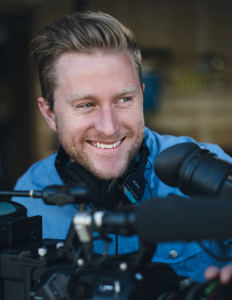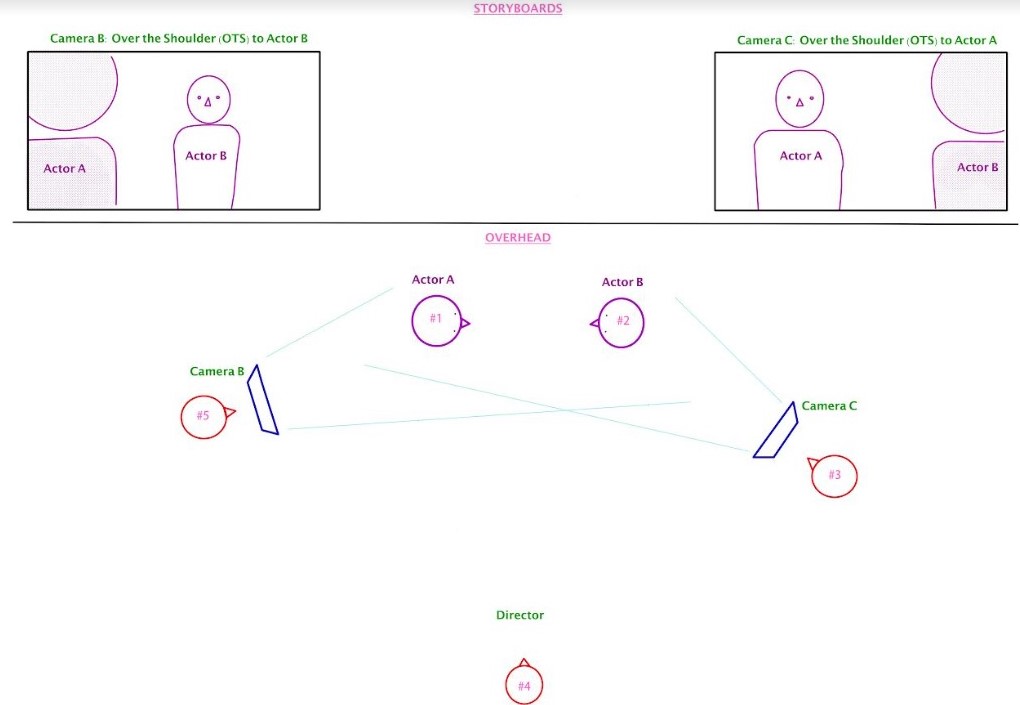On March 14th all 7th graders had a “Liyana half day”, where they watched the movie Liyana, discussed the film and had a workshop in film making, with one of the directors behind Liyana, Aaron Jospeh Kopp. Aaron grew up in Eswatini in South Eastern Africa, where the film takes place. Later on he moved to the United States, where he lives now. He has traveled over the world for doing documentaries, films and more, for example for HBO, Netflix Originals, National Geographic, Discovery, UK Channel4, CBS, CNN, and PBS.

About film making Aaron says says:
”We are made up of stories. Stories are how we envision our future, how we growing up and how we are becoming succesful. Stories are the most powerful tool we have.”
During the workshop the students made film clips via the app WeVideo as they had downloaded, watched a tutorial for and (hopefully) tried out beforehand.
During the filming the students tried out an ”over the shoulder shot” (see shot diagram below). For this excercise they were assigned different roles. They were director, actor 1 or 2 and cameraperson 1 or 2.

- Actor 1: Asking questions. Examples from Aaron were: What is your favorite film and why? Tell me about something you find inspiring and beatiful and why. Tell me about something you love to do for fun and why you love it so much.
- Actor 2: Answering questions in some complete sentences.
- Camera person 1: Follow and answer instructions from director, for example saying ”Rolling!” Recording from a stable position. Maybe zooming in.
- Camera person 2: (See camera person 1.)
- The director: Giving instructions like: ”Roll camera! / Press record!”, ”Action!”,
After the recording the director was asked to set up a folder at Google drive and share it with all group members. The camera persons uploaded the films in the folder. Aaron talked a bit why it is good to use multiple cameras, for example because ”angles give a lot of power” and the same scene can look different from different angles.
Then the students got to practice editing. They cut the films into slices, used speaker, muted and unmuted the sound, muted the listener, sampled text and more. Aaron talked a bit about film makers having the power to decide what people are saying in films, that it is possible to manipulate sound and thus to shape an illusion. Aaron encouraged the students to try out to mix the answers, to make fun / weird things and check what is happening. He talked about film making as a way to practice resilience, to make failures and bounce back again. ”That is ok to make failures”, Aaron said, ”because in all film making , failure is the best teacher, so you need to think that you will understand more next time.”
Aaron showed ”the hyena scene” from the Liyana movie, as the students had watched earlier the same day and discussed earlier during the day, out from the themes empathy and resilience. He showed the hyena scene with no music, right music and wrong music. Aaron then talked about how connected music is to emotions or what is happening emotionally. Without music a film usually feels flat while if you add music, it opens up for drama and excitement. You should add music late in the technical process though, Aaron advised, for ”the emotional truth of the story you are telling”. There is no guide for how to do it, but it comes down to your instincts.
At the end of the workshop the students got the chance to ask Aaron questions.
-Why did it take 10 years to develop the film Liyana?
-We were a small team with not a lot of money, so we had to do a piece at a time and raise money in between that. We also had other jobs at the same time, so we were juggling two different occupations.
-Did you personally get to meet the kids in Liyana?
-Yes, I even knew them before starting to make a film about them. After 20 years now, we are still in touch and friends. I am happy that I got the chance to connect and get to know them. I feel so much respect for who they are, what they have experienced, the pain they went through, what strong, imaginative and beautiful ideas they have. To you I would like to give the advise to be true to who you are. In that way you will grow bigger and the truest version of who you are is what the world needs the most.





This workshop was part of the school’s Creative School project supported by the National Arts Council.
